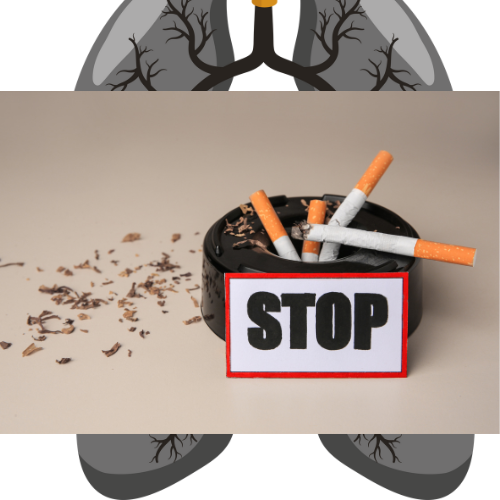Smoking has been a prevalent habit for centuries, often glamorized in movies and pop culture. However, beneath the allure lies a harsh reality: smoking is one of the leading causes of preventable diseases and premature deaths worldwide. In this blog, we will delve into the numerous reasons why smoking is bad for you, exploring its impact on your health, your loved ones, and even the environment.
The Health Risks of Smoking
1. Respiratory Damage
When you inhale cigarette smoke, you introduce thousands of harmful chemicals into your lungs. These chemicals irritate the delicate tissues of the respiratory system, leading to:
- Chronic Obstructive Pulmonary Disease (COPD): Smoking is the primary cause of COPD, a group of diseases including chronic bronchitis and emphysema that make breathing increasingly difficult.
- Lung Cancer: Smoking is responsible for about 85% of all lung cancer cases. The carcinogens in tobacco smoke cause mutations in lung cells, leading to cancer.
- Asthma Exacerbation: Smokers are more likely to develop asthma, and those with asthma find their symptoms worsening due to smoking.
Smoking-related respiratory damage doesn’t happen overnight. Over time, smokers experience shortness of breath, persistent coughing, and decreased lung function, significantly impacting their quality of life. These effects often worsen with age, leading to chronic health issues that require ongoing medical care and can severely limit daily activities.
2. Cardiovascular Issues
Smoking doesn’t just harm your lungs; it’s a significant threat to your heart and blood vessels:
- Heart Disease: Smokers are 2-4 times more likely to develop coronary heart disease compared to non-smokers.
- High Blood Pressure: The nicotine in cigarettes raises blood pressure and narrows blood vessels, increasing the risk of stroke and heart attack.
- Peripheral Artery Disease (PAD): Smoking reduces blood flow to the extremities, which can lead to severe complications like amputation.
Smoking accelerates the buildup of plaque in arteries, a condition known as atherosclerosis. This can result in life-threatening events such as heart attacks or strokes. Even light or occasional smoking can significantly elevate your risk of cardiovascular disease, making it crucial to quit as early as possible to reduce these risks.
3. Cancer Risks Beyond the Lungs
Smoking is linked to various types of cancers, including:
- Mouth and Throat Cancer: The chemicals in tobacco irritate and damage the cells in the mouth and throat.
- Bladder Cancer: Smokers have a significantly higher risk of bladder cancer due to the presence of carcinogens in cigarette smoke.
- Pancreatic Cancer: Smoking is a leading cause of pancreatic cancer, one of the most aggressive and deadly forms of the disease.
- Esophageal Cancer: Smoking increases the risk of esophageal cancer, particularly when combined with heavy alcohol consumption.
- Stomach Cancer: Smoking contributes to the development of stomach cancer by increasing the risk of Helicobacter pylori infection and acid reflux.
The cancer risk associated with smoking isn’t limited to these areas; it also extends to the kidneys, liver, and even the blood (in the form of leukemia). Each cigarette increases the likelihood of genetic mutations that can lead to cancer, making smoking one of the most potent cancer-causing behaviors.
4. Impact on Reproductive Health
Smoking affects both men and women in profound ways:
- Reduced Fertility: Smoking lowers sperm quality in men and disrupts ovulation in women, making it harder to conceive.
- Pregnancy Complications: Women who smoke during pregnancy are at higher risk for miscarriage, premature birth, and low birth weight.
- Erectile Dysfunction: Smoking damages blood vessels, making it more difficult for men to achieve and maintain erections.
- Early Menopause: Women who smoke are more likely to experience early menopause, which can lead to long-term health issues such as osteoporosis.
Smoking’s impact on reproductive health doesn’t stop with the smoker. Babies born to mothers who smoke during pregnancy are more likely to experience developmental delays, respiratory issues, and increased susceptibility to illnesses throughout their lives. Quitting smoking before or during pregnancy is one of the most impactful decisions for the health of both mother and child.
5. Accelerated Aging
The chemicals in cigarettes accelerate the aging process by:
- Damaging Skin: Smoking reduces collagen production, leading to wrinkles and sagging skin.
- Causing Hair Loss: Smokers are more likely to experience premature hair thinning and graying.
- Weakening Teeth and Gums: Smoking increases the risk of gum disease, tooth loss, and bad breath.
- Bone Weakness: Smoking decreases bone density, increasing the risk of fractures and osteoporosis.
Smoking’s impact on appearance is often one of the first noticeable effects. Yellowing teeth, brittle nails, and a dull complexion are telltale signs that the habit is taking a toll. These effects, combined with the internal damage smoking causes, accelerate overall aging and reduce vitality.
Secondhand Smoke: Harm to Others
Smoking doesn’t just harm the smoker; it also endangers those around them:
- Children: Exposure to secondhand smoke increases the risk of asthma, ear infections, and sudden infant death syndrome (SIDS) in children.
- Adults: Non-smokers exposed to secondhand smoke are at greater risk of developing heart disease and lung cancer.
- Pregnant Women: Secondhand smoke increases the risk of pregnancy complications, including preterm labor and low birth weight.
Thirdhand smoke—residual nicotine and other chemicals left on indoor surfaces—is another concern. This residue can linger for weeks or months, posing risks to children and pets who come into contact with contaminated surfaces. The ripple effect of smoking reaches far beyond the individual, impacting families and communities.
Environmental Impact
Beyond the personal and social health risks, smoking also has a devastating effect on the environment:
- Deforestation: Tobacco farming contributes to deforestation, as trees are cleared to grow tobacco plants.
- Litter: Cigarette butts are the most common form of litter globally, taking years to decompose and releasing harmful chemicals into the soil and waterways.
- Air Pollution: Tobacco smoke releases pollutants into the air, contributing to poor air quality.
- Water Pollution: The production of cigarettes uses large quantities of water, and discarded filters pollute rivers and oceans.
The environmental impact of smoking is often overlooked, but it’s a significant contributor to global ecological issues. By reducing tobacco use, we can help preserve natural resources and protect the planet for future generations.
The Financial Burden of Smoking
Smoking is an expensive habit, with costs extending beyond the purchase of cigarettes:
- Healthcare Costs: Smokers are more likely to require medical treatment for chronic illnesses, leading to higher healthcare expenses.
- Lost Productivity: Smoking-related illnesses and premature death result in billions of dollars in lost productivity annually.
- Insurance Premiums: Smokers often pay higher premiums for health and life insurance due to the increased risk they pose.
- Fire Hazards: Smoking is a leading cause of residential fires, resulting in property damage and increased insurance claims.
For many smokers, the financial burden becomes a significant motivation to quit. The money saved from not buying cigarettes can be redirected toward healthier pursuits, such as fitness programs or travel, enhancing both physical and mental well-being.
Breaking Free from Smoking
Quitting smoking is one of the best decisions you can make for your health and well-being. Here are some tips to help you quit:
- Seek Support: Join support groups or seek guidance from a healthcare professional.
- Use Nicotine Replacement Therapy (NRT): Products like nicotine patches and gum can help reduce withdrawal symptoms.
- Adopt Healthy Habits: Exercise and healthy eating can improve your mood and help combat cravings.
- Avoid Triggers: Identify and avoid situations that make you want to smoke.
- Stay Patient: Quitting smoking is a journey, and it’s normal to face challenges along the way.
- Reward Yourself: Celebrate milestones in your journey to stay motivated.
Each step toward quitting smoking brings immediate and long-term benefits. Within weeks of quitting, lung function improves, and within months, the risk of heart disease begins to decrease. The positive effects extend to your mental health as well, with reduced stress and improved self-esteem.
The evidence is clear: smoking poses severe risks to your health, the well-being of those around you, and the environment. While quitting smoking can be challenging, the benefits far outweigh the effort. By breaking free from this harmful habit, you’re not just extending your lifespan; you’re enhancing the quality of your life. Take the first step today, and embrace a healthier, smoke-free future.
Remember, every cigarette avoided is a step toward a brighter, healthier tomorrow. Whether it’s through support groups, medication, or personal determination, quitting smoking is an achievable goal that will reward you and those you love in countless ways. The journey may be tough, but the destination is worth every effort.




